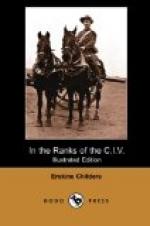CHAPTER I.
The “Montfort.”
A wintry ride—Retrospect—Embarkation—A typical day—“Stables” in rough weather—Las Palmas—The tropics—Inoculation—Journalism— Fashions—“Intelligent anticipation”—Stable-guard—Arrival.
With some who left for the War it was “roses, roses, all the way.” For us, the scene was the square of St. John’s Wood Barracks at 2 A.M. on the 3rd of February, a stormy winter’s morning, with three inches of snow on the ground, and driving gusts of melting flakes lashing our faces. In utter silence the long lines of horses and cloaked riders filed out through the dimly-lit gateway and into the empty streets, and we were off at last on this long, strange journey to distant Africa. Six crowded weeks were behind us since the disastrous one of Colenso, and with it the news of the formation of the C.I.V., and the incorporation in that regiment of a battery to be supplied by the Honourable Artillery Company, with four quick-firing Vickers-Maxim guns. Then came the hurried run over from Ireland, the application for service, as a driver, the week of suspense, the joy of success, the brilliant scene of enlistment before the Lord Mayor, and the abrupt change one raw January morning from the ease and freedom of civilian life, to the rigours and serfdom of a soldier’s. There followed a month of constant hard work, riding-drill, gun-drill, stable work, and every sort of manual labour, until the last details of the mobilization were complete, uniforms and kit received, the guns packed and despatched; and all that remained was to ride our horses to the Albert Docks; for our ship, the Montfort, was to sail at mid-day.
Hardships had begun in earnest, for we had thirteen miles to ride in the falling snow, and our hands and feet were frozen. As we filed through the silent streets, an occasional knot of night-birds gave us a thin cheer, and once a policeman rushed at me, and wrung my hand, with a fervent “Safe home again!” Whitechapel was reached soon enough, but the Commercial Road, and the line of docks, seemed infinite.
However, at six we had reached the ship, and lined up into a great shed, where we took off and gave up saddles and head-collars, put on canvas head-stalls, and then enjoyed an excellent breakfast, provided by some unknown benefactor. Next we embarked the horses by matted gangways (it took six men to heave my roan on board), and ranged them down below in their narrow stalls on the stable-deck. Thence we crowded still further down to the troop-deck—one large low-roofed room, edged with rows of mess-tables. My entire personal accommodation was a single iron hook in a beam. This was my wardrobe, chest of drawers, and an integral part of my bed; for from it swung the hammock. We were packed almost as thickly as the horses; and that is saying a great deal. The morning was spent in fatigue duties of all sorts,




